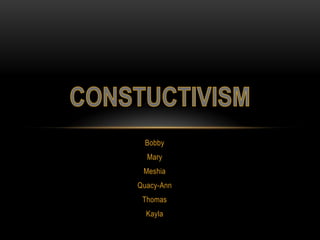
Learning theory
- 1. Bobby Mary Meshia Quacy-Ann Thomas Kayla
- 2. MAIN POINTS OF CONSTRUCTIVISM • The learner is an active and constructive process. • The learner is a constructor of information. • New information is linked to prior knowledge. • Knowledge is constructed based on personal experiences and hypotheses of the environment • Learning is not seen as a “blank state.” • Students learn by doing and being hands-on.
- 3. FOUR LEADING THEORISTS OF CONSTRUCTIVISM • Jean Piaget • Jerome Bruner • Lev Vigotsky • John Dewey
- 4. JEAN PIAGET • A psychologist who developed cognitive learning theory after studying children for many years. • He believed that children were active learners and did not need adults to motivate them. • He believed that children were learning on their own while moving through different cognitive stages and building on what they already knew.
- 5. PIAGET’S FOUR COGNITIVE STAGES • Stage 1: Sensorimotor- Learning takes place when the child uses his/her motor actions. • Stage 2: Preoperational- Children begin to use symbols and images. • Stage 3: Concrete Operational- This happens at age 7, when children begin to think logically. • Stage 4: Formal Operational- This happens at age 12, when children switch from concrete to abstract thinking.
- 6. JEROME BRUNER • An American psychologist. • Bruner proposed that learning is a active process. Children create new ideas based on past or current knowledge. • He believed that constructivist learners are more actively engaged in the learning process.
- 7. LEV VYGOTSKY • Russian educational psychologist. • Developed “Social Cognition.” • Believed that learning is mostly influenced by social development. • He came to the conclusion that learning took place within the a child’s social development and culture. • Vygotsky believed that children have a “zone of proximal development,” which is the difference between problem solving and the potential they have if peered up with a teacher. • Also came up with “collaborative learning,” which is when a child is paired with an adult or another child who is more advanced.
- 8. JOHN DEWEY • Dewey was a educational psychologist, philosopher, and political activist. • He believed that learning should be engaging and expand the learner’s experience. • He encouraged educators to create activities would relate to their students everyday lives. • In 1896 Dewey created the University Elementary School, also known as a Laboratory School. • At the school Dewey wanted the students to basically learn by working together with a teacher there to serve only as a guide. • In the 1900’s Dewey joined the “progressive education” which was a movement that focused on educating a child physically, mentally, and socially.
- 9. TECHNOLOGY AND CONSTRUCTIVISM • Constructivist learners can benefit a lot from technology. • Students will be able to complete a variety of different activities while learning a topic. • Ex. Students could be learning about photosynthesis and how it works. • Students will be able to go to certain informational websites to find out what photosynthesis means, how it works, and why it happens. • They can then take notes about what they found using a word document. • Study vocabulary words using electronic flash cards. • After taking notes they could create a replica or draw picture of how photosynthesis works.
- 10. WHAT TEACHERS DO UNDER THE CONSTRUCTIVIST THEORY • Teachers do their best to provide students with an environment where they can construct their own knowledge from a lesson. With this in mind a more hands on or conceptual lesson would be best as this allows the student to come to one of many viable conclusions regarding the lesson. Teachers must also come to view themselves as facilitators allowing the student to lead the construction of knowledge towards an area they value.
- 11. WHAT STUDENTS DO UNDER THE CONSTRUCTIVIST THEORY • Students take the lead under the constructivist theory and are the constructors of their own knowledge with a teacher as a facilitator. Students decide what is important and what is valuable within the lesson while the teacher provides guidance.
- 12. KEY CONCEPTS OF THEORY • Learning as experience, activity, and dialogical process. • Problem based learning. • Anchored Instruction. • Vygotsky Zone of Proximal Development. • Inquiry and discovery learning.
- 13. FINAL THOUGHTS • We firmly believe that constructivism would be a terrific form of teaching. We believe that much of learning is objective and is only as meaningful as the learner allows. In our opinion especially because we are students ourselves, we feel that students should be in charge of their learning and that teachers should indeed be facilitators and provide students with guidance towards their own goals that they as the learner have set for themselves.
- 14. CREDITS • Jean Piaget photo • Jerome Bruner photo • Lev Vygotsky photo • John Dewey photo